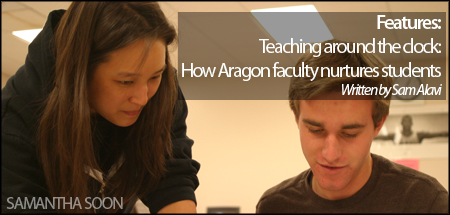
As the final bell for seventh period rings, sophomore students in Holly Dietz’s English class run up to the whiteboard to write their name down on the “help” list. Like most of the students at school, they want a good grade on their essay and can use all the help they can get. Like Dietz, many Aragon teachers stay after school and take time out of their own life to help students.
AS English teacher Holly Dietz explains, “When I assign essays, I usually stay during lunch and after school for between 30 minutes and an hour every day.”
Staying after school is a big commitment for teachers, since they are not specifically paid to do so. Dietz says, “The satisfaction of helping the students is enough to make it worth it. When students say things like ‘that helped a lot’, I know I have done my job.”
Sophomore Eli Mayerson has gotten help from Dietz in the past. “She really helped me a lot,” says Mayerson. “She looked at my essay and helped me out by looking at my thesis and quote choices. I felt a lot more confident after that.”
“If a student has a weak thesis statement, the essay will suffer. If I spend just a minute or so looking over the thesis statement and help make it stronger, the essay will be more successful. Something as small as that, can make or break an essay,” says Dietz.
Math teacher Rich Serrao explains, “I usually help students between two to three days a week during lunch with homework help, absent students, and students who are struggling. I may be missing my lunch period, but it is worth it because by students showing up, it shows that they are dedicated and concerned about their grade.”
English teacher Jennifer Wei also spends a great deal of time after school helping students.
“I help students with general writing, college essay brainstorms and editing, SAT math and SAT reading, and life issues,” she explains. “I am usually here until 5 p.m. on a good day and 7 p.m. on a busy night.” To students who arrive at school at 7:45 a.m. and leave promptly at 3:05 p.m., this may seem like a very long time to stay after school.
History teacher Jim Smith says, “I have office hours on Thursdays and I tell students that they can come to me anytime for help.” The commitment to helping students whenever they need it outside of class on the teacher’s own time is great, but teachers find it to be worth it.
Students have many ways of showing gratitude for this. “I get a lot of gifts around the holidays and after college recommendations are due. My favorite gift this year has been an elephant tissue box that Natalie Palter made for me in her Ceramics class. Last year, Sam Kennedy procured life-sized cardboard replicas of Edward Cullen and Buffy the Vampire Slayer. He cut a hole in Edward’s chest and poked a sharpened garden stake through it,” says Wei.
“Last year a senior gave me a pen from the college they were going to attend as a thank you for the help I gave the student freshman year. This meant a lot to me because I was remembered four years later,” says Dietz.
Although such acts of gratitude stick out in the teachers’ minds, gifts are not the only things that can be satisfactory for a teacher. “A good grade on an essay that I helped with is always satisfying. Knowing that you helped a student improve their essay is a very good feeling,” explains Dietz.
Spanish teacher Kathleen Rooney who has tutored students in the past explains, “More students should take advantage of teachers who offer help. Sometime, a student might be too shy to ask for help in class, so that one on one time with a teacher can be very valuable.”




